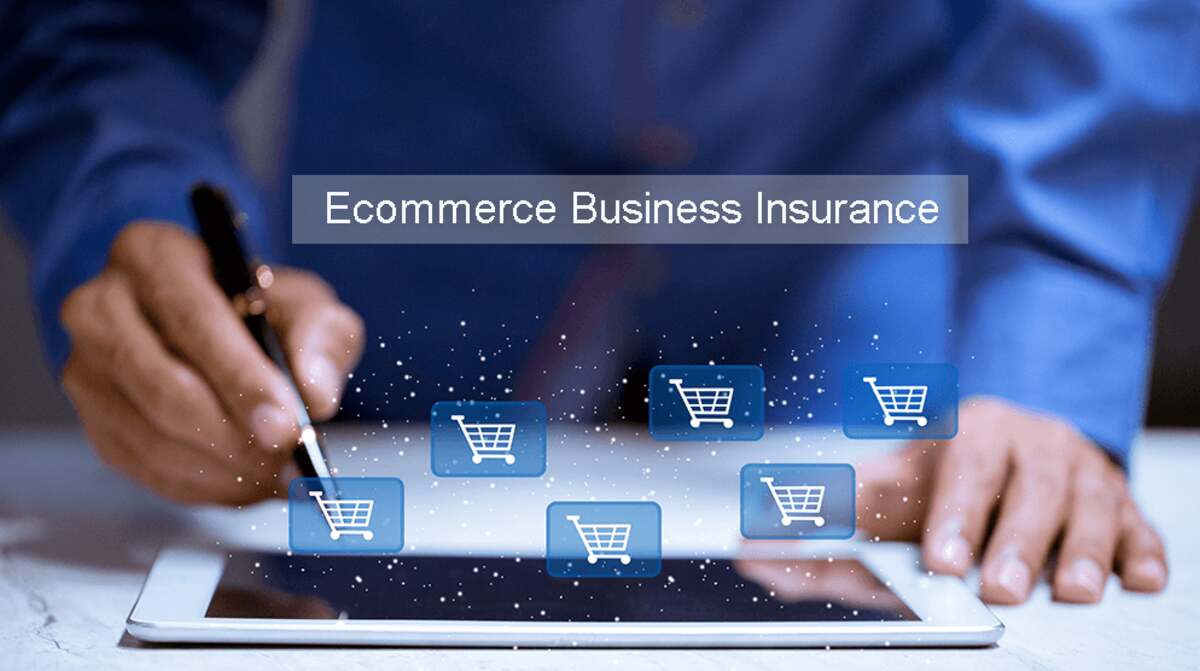Did you know 60% of small businesses are sued within the first five years? For online vendors, the danger is even greater. From cyber attacks to product liability lawsuits, online vendors face unique risks that can ruin their business. That’s where ecommerce business insurance steps in—a critical defense for online vendors.
Ecommerce business insurance protects your business against economic loss from unforeseen events to allow you to focus on growth, not shrinking. From having a dropshipping site or having a warehouse, the correct insurance eliminates exposure areas such as data breaches, claims for shipping damage, or lawsuit.
In this article, we shall explain why there is a need for ecommerce business insurance, the most important coverages, benefits, and tips on how to select the proper policy. We shall also provide answers to some of the most frequently asked questions to assist you in making an informed decision. Let us get started and safeguard your online enterprise for the future.
Why Getting Ecommerce Business Insurance Matters
Operating an online business is thrilling, but risky. Having ecommerce business insurance is necessary to safeguard your business and make it continue to thrive. Here’s why it should be a necessary investment.
Growing Demand for Business Insurance Online
Ecommerce is booming, with global sales expected to reach $6.3 trillion by 2025. With expansion comes risk. Cybercrime against online shops increased by 43% in 2024, cybersecurity reports indicate. From stolen data and hacking to product liability claims, the danger is present. Online business insurance protects you from financial ruin, covering lawyer fees, settlements, or data breach restoration. Without it, a single event can erase your profits.
Legal and Compliance Requirements
Running an ecommerce business usually entails special insurance to meet compliance requirements. For instance, if you rent a warehouse, general liability insurance is usually required to cover third-party accidents or damage to property. Workers’ compensation is also required in some states for businesses with employees. Noncompliance can result in fines or legal issues, so small business insurance is not something to negotiate when it comes to compliance.
Building Customer Trust
Customers like to buy from businesses that they trust. Having insurance badges on your site indicates that you’re trustworthy and customers feel secure that you’re prepared for any unforeseen circumstance. Insured businesses also get more B2B relationships, as suppliers like to deal with insured retailers. Ecommerce business insurance is not just protection—it’s a trust builder.
Large Ecommerce Business Insurance Types

Online companies are faced with numerous risks, and there is no single policy that will safeguard them against all. The following are the ecommerce business insurance types to consider, particularly for online retailing:
General Liability Insurance
General liability insurance is the foundation of small business insurance. It protects against third-party bodily injury, property damage, or advertising injury claims. For example, if a customer sues your store for damages from a defective product, it will pay for legal fees and settlements. It’s a must-have for any ecommerce business that has customers or partners.
Ecommerce Liability Insurance
Ecommerce liability insurance emphasizes product liability, protecting you from defective or dangerous product claims. This is particularly important for online retailers selling private-label items or dropshipping, where quality control may be difficult. For example, if a customer is harmed by a product you sold, this coverage pays for damages and legal fees, protecting your bottom line.
Cyber Insurance for Ecommerce
Cyber attacks are on the rise, and small businesses alone lose an average of $200,000 per occurrence, the Insurance Journal reports. Cyber insurance for e-commerce protects against data breach expenses, ransomware, or stealing customers’ information. It covers fees such as notifying affected consumers, system restore, and PR management. For operating stores, this is not an option in 2025.
Commercial Property Insurance
If you hold inventory in a warehouse or have an ecommerce store from home, commercial property insurance insures your physical assets. It insures against loss due to fire, theft, or acts of nature so you can replace your equipment or inventory. Home-based sellers need to realize that standard homeowners’ insurance does not cover business property, so this policy is essential.
Business Interruption Insurance
Website downtime or supply chain disruptions can halt your sales. Business interruption insurance compensates for lost income during these events. For example, if a server crash takes your store offline for days, this policy covers revenue losses and operating expenses, helping you recover quickly.
Workers’ Compensation Insurance
If your online business has employees, such as warehouse staff, workers’ compensation insurance is typically a requirement by law. It covers medical bills and lost wages for injured employees. The majority of states have this coverage as a requirement, and not complying can have you pay extremely heavy fines.
Benefits of Ecommerce Business Insurance
An investment in ecommerce business insurance is not just protection—it’s an investment in your business for long-term prosperity. Here’s why it’s good for your online business.
Financial Protection
A single accident or suit can devastate an uninsured company. For example, a $50,000 product liability suit can be covered by a $1,000 per year policy, which keeps you from having to pay out of pocket. Online store commercial insurance shields you from being personally liable for costly accidents, keeping you financially stable.
Risk Mitigation for Online Activities
Ecommerce businesses are confronted with particular threats, including slow shipping, chargeback fraud, or website hacking. Insurance insulates them against these risks by reimbursing them for related expenses, such as refund disputes or data retrieval. This shield keeps your business afloat even when unexpected issues occur.
Competitive Advantage
Insured businesses stand out in a competitive market. B2B consumers, such as suppliers or marketplaces, prefer suppliers with ecommerce business insurance for reliability. Clients also prefer to buy from retailers who are insured, which improves your brand reputation and sales opportunities.
Peace of Mind for Entrepreneurs
Operating an online shop is challenging. Knowing you’re protected by small business insurance allows you to focus on expansion, marketing, product innovation, or scaling, without concern for the risks. It’s a backstop that gives you the confidence to make tough decisions.
How to Choose the Best Ecommerce Business Insurance

Choosing the right ecommerce business insurance is a daunting experience, but a proper plan makes it achievable. The following are the steps to achieve the perfect policy.
Assess Your Business Risks
Start by evaluating your risks based on your business model. Dropshipping sites would have ecommerce liability insurance as their first concern, whereas stock-based businesses need commercial property insurance. Use this checklist:
-
Product types (e.g., high-risk products such as electronics)
-
Sales volume and revenue
-
Staff numbers and activities (e.g., warehousing)
This serves to determine priority coverage.
Compare Insurance Providers
Shop around and research great insurers like The Hartford, Hiscox, or Progressive. Compare coverage limits, premiums, and customer reviews to make an informed choice. Look for providers that sell online business insurance as they understand ecommerce-related risks. Online tools can be used to compare quotes and make it simpler.
Customize Your Policy
Tailor your policy to your requirements. For example, busy retailers must have ecommerce cyber insurance to protect against data breaches. Utilize a Business Owner’s Policy (BOP), which bundles general liability and property insurance for cost savings. Tailoring avoids overpayment for unwanted coverage.
Work with an Insurance Broker
An insurance broker provides professional advice, sorting through complicated policies to get the best rates. They are able to negotiate discounts and clarify fine print, saving you money and time. Brokers are particularly useful for first-time purchasers looking for small business insurance.
Review Policies Annually
Your company grows, and so should your insurance. Check your policy annually to update coverage as you grow, introduce products, or employ personnel. Periodic renewal guarantees you’re constantly safeguarded against emerging threats.
Environmental and Social Factors in Insurance Ecommerce
In 2025, online businesses will be more aligned with sustainable and ethical practices. Insurance for online businesses can ensure such practices.
Insurance Choices and Sustainability
Environmental research, such as that provided by the Content Marketing Institute, indicates insurers with ESG-compliant policies. These include coverage for green projects, including carbon-free shipping or packaging that is sustainable. Selecting these policies minimizes your impact on the environment while appealing to environmentally friendly clients.
Social Responsibility
Many insurers integrate social good, including supporting community programs or diversity initiatives. Selecting providers that have ethical policies aligns your company with customer values, building your brand reputation. Research the social contribution of insurers to make a well-informed decision.
FAQs Regarding Ecommerce Business Insurance
Got ecommerce business insurance questions? Below are some answers to frequently asked questions.
What is ecommerce business insurance, and do I need it?
It’s a set of policies that protects online stores from risks such as lawsuits, cyberattacks, or property damage. Any online business needs it, whether small or big, to avoid financial losses.
How much does ecommerce business insurance cost?
Premiums are different, but small companies usually pay $500–$2,000 a year, according to Small Business Trends. The type of coverage and the amount of sales influence premiums.
What are the risks not included in standard policies?
Exclusions generally apply to deliberate damages, some natural disasters (such as floods), or professional errors. Flood insurance can be added to the coverage.
Can I get insurance for a home-based ecommerce business?
Yes, commercial property insurance does include equipment and inventory stored at home. General liability and cyber insurance are also included, as per your operation.
Why is cyber insurance good for my online business?
Ecommerce cyber insurance protects against ever-increasing cyber threats of 2025, such as data breach costs, system restoration, and customer notification.
Conclusion
Ecommerce business insurance is not an afterthought—it’s a key to an online store’s success. From insulating you from lawsuits to building customer trust, the right coverage enables your business to weather any storm. With cyberattacks and product liability threats on the rise, taking out online business insurance is a smart move for financial security and peace of mind. Don’t leave your business exposed. Evaluate your risk, compare carriers, and tailor a policy that is suitable for you. Call a good insurer or broker today to get started. With the proper ecommerce business insurance, you can build your online empire without worrying about surprise delays.
If you want more Information, explore our website: MyWebInsurance





